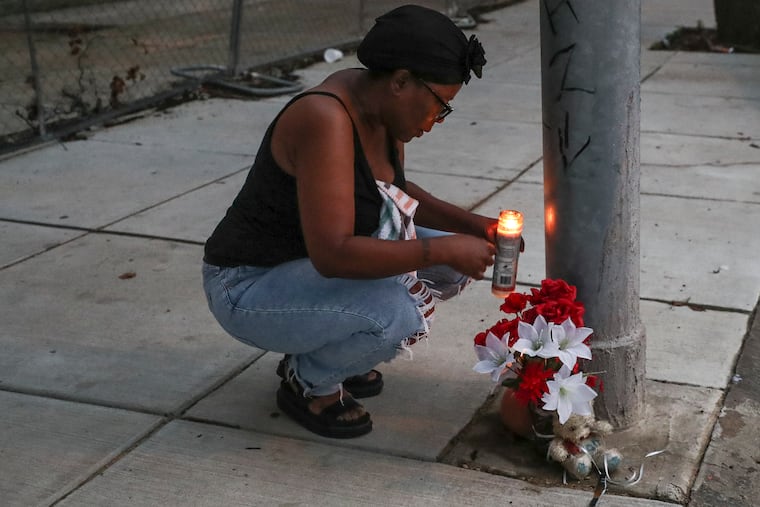City residents don’t trust police. The latest mass shooting proves that — again.
Improving public trust of police was at the forefront of a supposed reckoning for law enforcement fueled by the murder of George Floyd by police in 2020. What happened?

The city’s deadliest shooting in decades is still under investigation, and even after a series of recent disclosures, there is still much we don’t know about the precise sequence of events that led to the carnage. But what is already abundantly clear is how the deep mistrust many Philadelphians have of the Police Department can sometimes have deadly consequences.
In a surprising update this week, police said that one of the victims, Joseph Wamah, 31, was shot and killed in his Kingsessing home 44 hours before the gunman returned to the Southwest Philly neighborhood on July 3 and used the same assault rifle to kill four people and injure several others.
A neighbor who heard the gunshots outside Wamah’s home called the police. But officers were dispatched to the wrong address — the 1600 block of North 56th Street, not South 56th Street — and reportedly left when they did not see any evidence of gunfire.
The 911 caller, who would only speak to The Inquirer on the condition that she not be named, said the police dispatchers called her back that night to ask for more details. But she hung up when they placed her on hold, assuming they weren’t taking her call seriously because of her own experience with the department. Two of her sons were killed in recent years — one in 2021, another in 2022 — and neither homicide has been solved.
I write a lot about the Police Department’s poor performance in solving murders, leaving loved ones feeling abandoned and forgotten. But this ineptitude doesn’t just affect the loved ones of murder victims left behind — in this case, it may have prevented police from stopping additional murders.
What if the police had gone to the right address on July 2? Police Commissioner Danielle Outlaw said there was little chance to save Wamah even if they had because the call came in more than an hour after the incident. But what if Kimbrady Carriker, the man police have identified as the shooter, had been stopped before he returned nearly two days later to indiscriminately open fire on a neighborhood that already has one of the highest rates of gun violence in Philadelphia?
Would Da’Juan Brown, the youngest victim at 15, have fulfilled his dream to play college basketball? Would Lashyd Merritt, 21, have traveled the world? Would Dymir Stanton, 29, still be around for his 4-year-old daughter? Would 59-year-old Ralph Moralis have been preparing to walk his oldest daughter down the aisle the weekend after the shooting instead of his family preparing to lay him to rest?
Would countless loved ones have been spared the trauma routinely experienced by so many in the city?
At a news conference about the botched 911 call, Outlaw said that “hindsight is always perfect,” and that she “didn’t think that this is a time to say, ‘Well, we shouldn’t trust the Police Department,’ because we did what we could with what we had.”
That remains to be seen, but Outlaw’s suggestion that this is not the time to explore Philadelphians’ fractured relationships with police is absurd. It also echoes the head-in-the-sand approach adopted by other officials who insist, for example, that we shouldn’t talk about strengthening gun laws after a mass shooting or taking steps to address climate change after extreme weather events.
And wasn’t public trust of police at the forefront of a supposed reckoning for law enforcement that was fueled by the murder of George Floyd by police in 2020? Didn’t we commit then to improving the level of trust between police and the public they serve until that relationship improved?
Now is precisely when we should be talking about the consequences of a community losing faith in the institutions charged to protect them, from residents hesitant to call the police — Wamah’s shooting went unreported by other neighbors — to not expecting much even when police do show up. The 911 caller who gave up on police responding to her report of gunfire was already in despair over no one being held accountable for killing her sons.
Outlaw said even if the investigation finds that police going to the wrong address was a case of human error and not policy or procedural violations, it’s the department’s responsibility to determine what more can be done to decrease the chances of something like this happening again.
That’s something, I suppose — even if it won’t be of much solace to the loved ones of those killed. But it’s also the department’s responsibility to determine what can be done right now to improve trust between police and the public — and that’s not going to happen with the neighborhood cookouts and basketball games the department loves to tout as community outreach.
It also has to happen when a potentially preventable calamity lays bare the deep fissures between those charged to protect and serve our city and those who no longer believe anyone is fully committed to doing either.